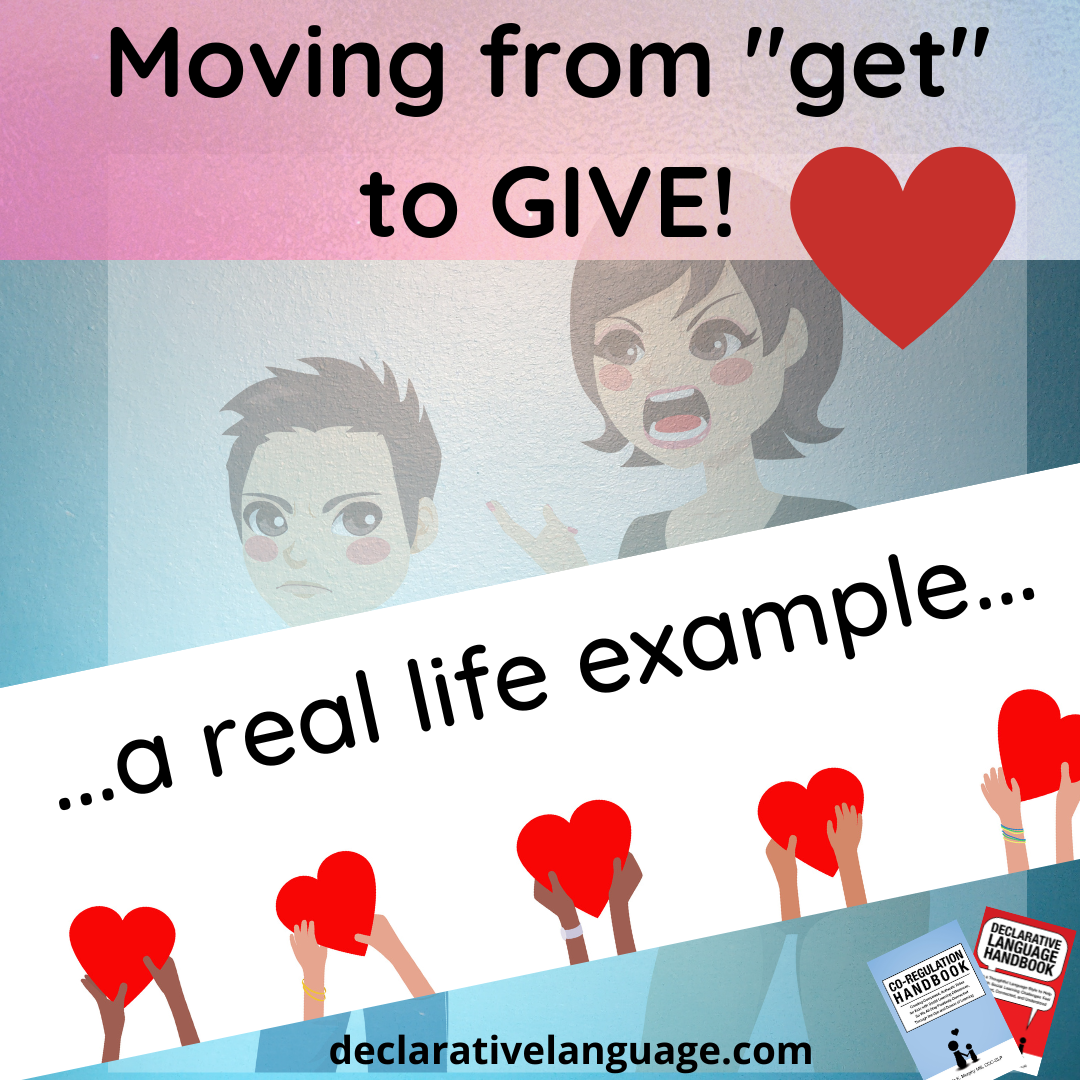GIVE, not get… a real life example!
As we get to know participants in our DL Workshop and hear how they are applying declarative language and co-regulation in their everyday lives, I am always moved … and impressed! I wanted to share one of our participant’s homework from this past week, as it perfectly illustrates the concept of GIVE, not get.
I’ll let this parent, Anna, speak for herself, and then follow up below with the small but important moments we noticed and appreciated in her approach to her child.
-----------------------
Anna’s homework:
We were having a family dinner outside with our family, my parents (kids, grandparents) and my sister and her family with her two younger kids. Danny was at the table, and he decided about halfway through the meal that he wanted something else for dinner, not what we served. He came over to ask us if he could make some mozzarella cheese. We told him he couldn’t have it now in front of everyone because it wasn’t polite and that he could eat what was prepared. We told him if he wanted the mozzarella cheese later on, after dinner, he could have some.
He got very angry at us and stormed off from the table. We were pretty upset with him because he was being rude to the rest of our family by not staying at the table for dinner and socializing with everyone. Bill, my husband, stormed off into the other room to talk with him and then came back to the table exhausted. Danny was refusing to come back to the dinner table, and he was now sitting in the living room on his phone alone.
I waited a while and then told Bill I was going to go in and try to use declarative language with Danny. I wasn’t so confident in my abilities, but I just kept thinking no questions, only comments.
I went into the living room and saw Danny lying on the couch, back towards me, on his phone. I went over to him and sat down next to him on the couch and said, “We miss you at the table. You are in the living room all alone,” and then was quiet (this was the hardest part for me). He kind of grunted at me but was still on his phone. I said, “Your phone seems to be distracting you right now,” and he put it down.
Then he turned to me to tell me that he didn’t like to just talk with the little kids, and that it was boring for him to be at the table discussing things a 5- and 3-year-old were discussing. I told him that we wanted to be with him, and I told him we missed him again. I also told him we were discussing some vacation ideas and we’d love his input. Then I walked away.
Eventually he came in and joined us for the rest of the dinner. It was a real success.
--------------------------
What we noticed:
1. This would have been as easy situation to get into a power struggle with Danny. The power struggle could’ve been over not wanting to eat what was served, leaving the table, not wanting to engage with younger cousins…. any number of things! In fact, Anna shared that typically these situations have ended in arguing and anger all around.
2. Anna set her intention prior to approaching Danny. She knew she wanted to try something different, and she worked up the courage to do it. Her changes included:
approaching Danny with an open heart and mind.
meeting him where he was at - to better understand what might be going on for him - and from that place, problem solve together.
thoughtful pacing – being mindful to allow silence, not talking too much, giving Danny time to think and process her communication.
giving Danny space to make a repair on his own.
And importantly,
Anna felt unsure but gave it a try anyway! She was willing to go outside of her own comfort zone with the hopes of helping, modeling, and creating space for her child to then do the same.
What did we learn?
Competence is often at the heart of all breakdowns. We learned that perhaps the upset was not about the food but was about Danny not feeling competent at the dinner table. Anna shared there were many people, and likely many conversational threads, at the table, and we wondered if this may have created an environment that overloaded Danny. In addition, Danny has struggled with perspective taking, so it really could have been hard for him to figure out how to connect with younger cousins.
Silence and space are vital tools. Giving Danny time to process her statements was incredibly important. Anna shared that being quiet was hard for her to do, but in that quiet, Danny came through with important information about his feelings, and identified the problem. Now, he and Anna can think about this together for next time.
What did we accomplish?
Resilience. Danny coming back to the table on his own, and independently making that repair, is everything! He recovered from a setback, and “got back on the horse” in a good enough way. This is what the building of resilience looks like. Now, Danny (and everyone really!) will walk away from this situation remembering that he came back and tried again! And things ended on a positive note (versus the alternative).
Connection. Certainly, Anna felt closer to Danny after this exchange and I’m sure Danny felt better understood. This connection will lead Danny to turn towards Anna more often when he is not feeling competent, versus turning away. Keeping kids open to learning, especially when things get tough, is one of the most important things we are working towards.
Problem Solving. The groundwork has now been laid for Anna and Danny to figure out how to help him manage these situations in the future. Before the next family gathering, they can plan, they can practice perspective taking, and importantly, they can proactively create competent roles for Danny (i.e., “Let’s think of something you like to talk about, that your younger cousins will like too!”). This will help him hang in there next time around.
Bravo Anna! You are an amazing teacher to us all and Danny is so lucky to have you. Thank you for GIVING, not getting, and trying something new … one exchange at a time.
Have a great week!
If you like my Sunday Snippets of Support, you can receive them directly to your inbox here.



